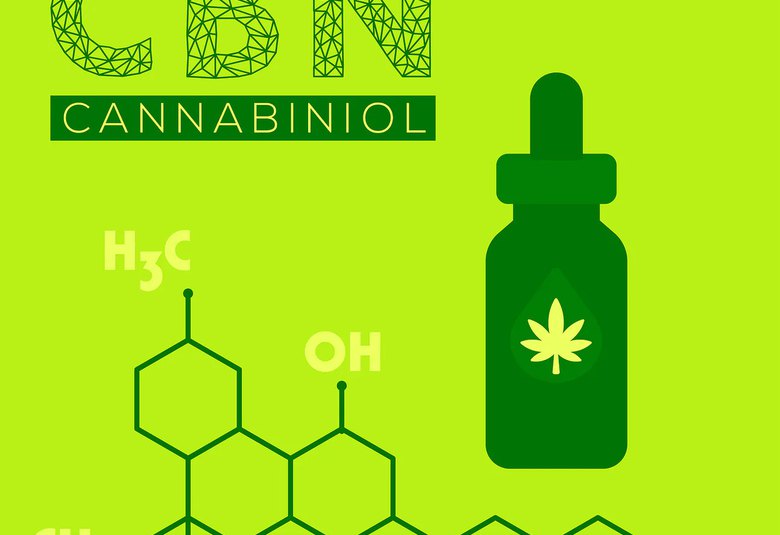What Is CBN and How Is It Different from CBD?
Feb 16, 2021

There have been many conversations in recent years about the ever-increasing popularity of cannabidiol (CBD) on the market today. As you may already know, CBD is a cannabinoid that is derived from the incredible hemp plant. Many may not be aware that this variety of cannabis plants also contains over 100 other cannabinoids. One of the most famous of these is tetrahydrocannabinol (THC). But as CBD has increased in popularity, other lesser-known cannabinoids have begun to receive the recognition they deserve as well. One such cannabinoid is CBN.
What Is CBN?
Just like CBD, cannabinol (CBN) is a cannabinoid that is found in the cannabis plant. Cannabinoids, along with other elements of the cannabis plant, such as terpenes and flavonoids, interact with the body to produce many beneficial results. Each of these cannabinoids increases or decreases in quantity as the hemp plant matures, and each has its unique characteristics.
CBN is produced from the decomposition and oxidation of the THC cannabinoid throughout the hemp plant’s life cycle. This means that the older the hemp plant is and the more oxygen and sunlight it has been exposed to, the higher the CBN content within that plant.
Just like CBD, CBN is federally legal throughout the United States. But some states have stricter regulations regarding the sale and use of hemp plant products than others. This cannabinoid and all hemp-derived products, became legal on a federal level when The Farm Bill passed back in 2018. The bill specifically legalized only hemp products that contain no more than .3% THC by weight. As part of the bill, CBN and other non-intoxicating cannabinoids are considered legal substances, just like CBD.
How Is CBN Different from CBD?
While these two cannabinoids are similar in many respects, there are some distinct differences between the two.
- Abundance – CBD is the second most abundant cannabinoid in a mature cannabis plant. THC tends to be the most prevalent, especially in the marijuana strains. However, CBN is only found in significant amounts in older hemp plants exposed to a lot of sunlight. For these reasons, many manufacturers choose to break down the THC into CBN during processing.
- Appetite – Anecdotal evidence suggests that CBD tends to decrease the user's appetite. Conversely, CBN tends to increase one's appetite.
- Sedation – CBN, by itself, is not known to be sedating. However, anecdotal evidence suggests that CBN increases the sedation properties of THC when used in combination. CBD, by itself, is more likely to enhance the user’s awareness than to cause sedation.
- THC Interaction – Some recent studies have shown that CBN may increase some of the positive effects of THC, like appetite and sedation. On the other hand, CBD has been shown to decrease some of the negative side effects of THC, like paranoia and anxiety.
- Intoxication – Neither CBD nor CBN alone is known to cause intoxicating effects. However, CBN can increase the intoxicating effects of THC. If you are using a product that contains CBN, you may want to make sure that it doesn’t also contain THC if experiencing an unmanageable “high” is an issue.
Product Labeling
You may be asking yourself why we are talking about a cannabinoid like CBN that is mostly found in combination with other primary cannabinoids like CBD and THC. Indeed, many of the CBD products available include CBN, CBG, and other secondary cannabinoids, as well as terpenes and flavonoids from the hemp plant. These combinations are touted on CBD product labels as "full-spectrum" and "broad-spectrum."
As a CBD enthusiast, it is helpful to know the importance of a product being labeled as full-spectrum or broad-spectrum. Studies and anecdotal evidence suggest that when CBD and other cannabinoids, along with terpenes and flavonoids, are combined into one product, there is a greatly increased benefit to the user compared to a CBD isolate alone. This increased benefit is what is now commonly labeled "The Entourage Effect."
However, labels do not always tell the entire truth. All of this information about the increased wellness benefits of "The Entourage Effect" is irrelevant if the label on the product you purchase is inaccurate. According to one recent study, there are many CBD brands on the market today, and 70% of the CBD products tested were mislabeled in one way or another. In many cases, the product contained significantly less CBD than was shown on the label, and some products contained no detectable CBD at all! That is why you must check to make sure that a third-party laboratory tested any CBD or other cannabinoid products you buy.
All of Our Products Are Tested By a Third-Party Laboratory
We at PharmaCBD take great pride in our vast inventory of CBD and Delta-8 THC products. We are proud because of the transparency we offer to our loyal customers. A third-party laboratory has tested every single one of the products on our shelves. What's more, every batch test is posted on our website and available for review by our clients. This kind of transparency allows our customers to compare the laboratory report to what is on our products' label. This comparison confirms that what is on the label is actually in the product – and nothing more.
So if you are looking for a broad-spectrum CBD product like our THC 1858 MG Tincture Oil or could use some help getting to sleep with our full-spectrum Triple Layer PM Bears with Melatonin, you can count on PharmaCBD. We offer you many CBD and Delta-8 THC products that are as good on the inside as the label brags on the outside. We even hold our entire line of Pet Products to the same high standard.
Shop with us online or contact us today. We look forward to serving you soon!
